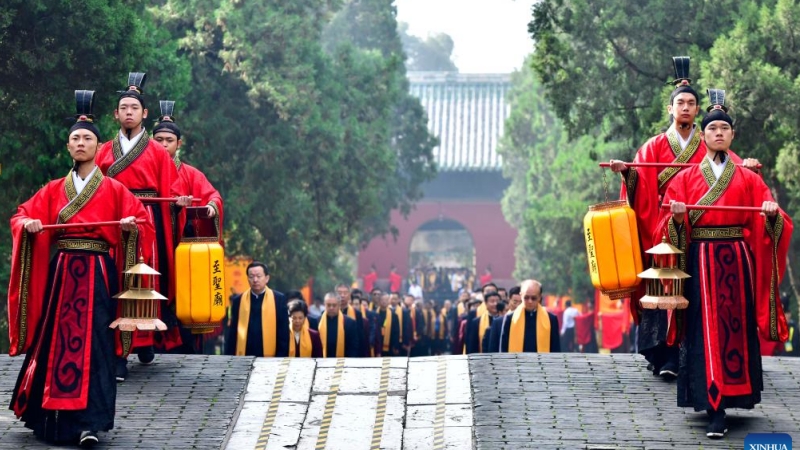Feature: A book threading together China, U.S.
CHICAGO, Oct. 9 (Xinhua) -- Years after returning from China, where Hugh Shepard and his parents lived for four years, Shepard still remembers his life in Beijing vividly.
In his first Chinese language test at Yew Chung International School in Beijing, "I received a score of 30 percent." From then on, "I studied Chinese every day, and got a score of 87 percent on the next test."
"After living in Beijing for a year, I became comfortable using Chinese to buy tickets, order food, and I became more familiar with both the city of Beijing and my school," he said.
Shepard's experience in China was collected in the book "West Meets East: 100 essays from university students in the United States," composed by American university students studying Chinese and jointly published by the Beijing Language and Culture University Press and Phoenix Tree Publishing Inc.
Shepard keeps the habit of studying Chinese after returning to the United States, and is now a freshman at the University of Chicago.
Cold weather in Chicago reminded him of his ice festival experience in Harbin, capital of Heilongjiang Province in Northeast China, and the taxi driver there. "Harbin and Chicago have much in common. Both cities have good universities, and both have freezing winters. Like the taxi driver we met in Harbin, many Chicagoans are very proud of their hometown."
Valeria Gogunska, a student at the University of Illinois Chicago, has never been to China. But in her years' study of Chinese, she learnt an important Chinese custom, social respect.
"I find that respect in China is very distinctive. In Chinese society, respecting one's elders is very important. I believe that this social custom can greatly improve social relations."
"The respect that is advocated by Chinese society not only helps strengthen family relations, but also helps maintain harmonic and happy social relationship," Gogunska said. "Respect is the cornerstone of China's 5,000-year-old maintenance of a harmonious society."
Gogunska's knowledge of China was also collected in the book, bilingual in Chinese and English, which falls into eight sections, including "My Chinese Stories," "Journeys of Learning Chinese," "Deep Friendships," "Cultural Exchange," and "Current Affairs Commentary."
The 100 essays were carefully selected from more than 300 student essays across more than 60 universities in the United States, said Gu Licheng, the book's chief editor and a Northwestern University professor.
Despite their differences, these essays "have one commonality: they all show the students' passion for the Chinese language and interest in China," Gu said, adding that the authors of the essays can become "non-governmental ambassadors to maintain the friendship between China and the United States, to enhance the mutual understanding between the Chinese and American people."
In a letter to readers, former Northwestern University President Morton Schapiro recalled his visit to China. "Highlights for me included climbing the Great Wall with our students, touring the Imperial Palace together, and visiting the magnificent Terracotta Warriors and Horses in Xi'an."
"Our collective future depends on the successful nurturing of today's young people into truly globally minded leaders," he stressed.
Shepard has his thought. "Despite the many cultural, economic, and political differences between America and China, the two countries have much in common," he told Xinhua.
"If we study foreign languages, and learn more about different cultures, we can broaden our perspectives, and discover interesting characteristics of different places. And this knowledge and experience will contribute to improving international relations," he said.
Photos
Related Stories
Copyright © 2023 People's Daily Online. All Rights Reserved.









